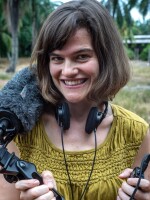
Michaeleen Doucleff
Michaeleen Doucleff, PhD, is a correspondent for NPR's Science Desk. For nearly a decade, she has been reporting for the radio and the web for NPR's global health outlet, Goats and Soda. Doucleff focuses on disease outbreaks, cross-cultural parenting, and women and children's health.
In 2014, Doucleff was part of the team that earned a George Foster Peabody award for its coverage of the Ebola outbreak in West Africa. For the series, Doucleff reported on how the epidemic ravaged maternal health and how the virus spreads through the air. In 2019, Doucleff and Senior Producer Jane Greenhalgh produced a story about how Inuit parents teach children to control their anger. That story was the most popular one on NPR.org for the year; altogether readers have spent more than 16 years worth of time reading it.
In 2021, Doucleff published a book, called Hunt, Gather, Parent, stemming from her reporting at NPR. That book became a New York Times bestseller.
Before coming to NPR in 2012, Doucleff was an editor at the journal Cell, where she wrote about the science behind pop culture. Doucleff has a bachelor degree in biology from Caltech, a doctorate in physical chemistry from the University of Berkeley, California, and a master's degree in viticulture and enology from the University of California, Davis.
-
Many parents are worried about their kids losing themselves for hours on their phones. Turns out, teens are troubled too. But they also know a lot about how to get unhooked. Here's how they do it.
-
At a time of rising rates of depression and anxiety among teens, the American Psychological Association warns parents that their children need more protection when they are online.
-
Pigs and goats likely catch it too. It's been found in humans' noses in the Southwest — and in the air at airports and at chicken farms in Malaysia.
-
The two brightest planets in Earth's night sky are millions of miles apart. But due to an astronomical quirk, they appear to be engaging in a cosmic dance tonight. Now that's a moment of awe.
-
Early fears of an escalating outbreak have not come to pass. Scientists are finding that the virus needs a very particular set of circumstances to spread effectively.
-
The testing system set up by the CDC actually deters doctors from ordering a monkeypox test, and many physicians aren't familiar with the disease, resulting in too few tests and little tracking.
-
Scientists in Britain have detected multiple versions of the virus in wastewater. Officials say the risk to the public is extremely low and urge people to ensure their polio vaccines are up to date.
-
The cases point to possible sexual transmission of this cousin of smallpox — a previously unknown method of spread for monkeypox.
-
My 6-year-old has been exposed to SARS-CoV-2 at least four times and never tested positive. Many people fall into that category. Researchers have theories about why they've been able to ward it off.
-
The studies offer the strongest evidence to date of a link between the animals at the seafood market and the spread of SARS-CoV-2. A top virus sleuth gives the details.










